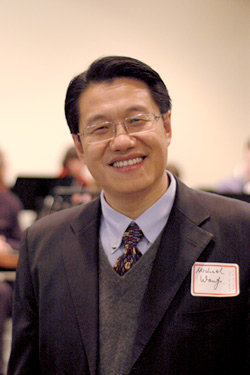University Relations
Communique
The online newsletter for UCCS faculty and staff. Brought to you by the UCCS Office of University Relations.
You can view the CURRENT ISSUE, browse the ARCHIVES, send us an EMAIL, and even SUBMIT a story.
Volume 63, Issue 2
December 11, 2009
Visiting Chinese professor aims to bridge cultures
 The United States and China are like brothers, according to a UCCS visiting scholar.
The United States and China are like brothers, according to a UCCS visiting scholar.
“Occasionally, brothers disagree,” Shiquan “Michael” Wang, a visiting professor to the Department of Communication, said. “But like brothers, the two countries have much in common and are important to each other’s futures.”
Wang, 46, has spent most of his adult life explaining the new China to Americans and Europeans. He worked as an English teacher, as a press officer for municipal government, a newspaper assistant editor in chief, bank manager and as associate professor at a new national executive leadership academy in China. Now, as a UCCS visiting scholar, he is continuing his mission, having spent the fall semester in an American culture immersion and preparing to teach two for-credit courses and an evening no-credit volunteer Chinese language class.
He lives in Steamboat, part of the UCCS Housing Village, earned a Colorado driver’s license, and served as a guest lecturer in communication and public administration courses throughout the fall. His immersion continued with the purchase of a second-hand car, learning to drive in a Colorado snowstorm, and joining the congregation of a Colorado Springs Christian church.
Now, he’s ready to teach. This spring, he will teach two courses, Communication 490: Chinese Culture and Communication and Communication 490: Contemporary Chinese Leadership and Media. From 6 to 8 p.m. every Thursday, he teaches a non-credit Chinese language course that is open to faculty, staff and students.
“I felt I wanted to give back,” Wang said. “I have been given an extraordinary opportunity and been treated so very well by so many that this seemed to be a natural extension.”
The courses will focus on contemporary Chinese leadership as well as Chinese culture and communication. While different, the courses have a similar goal, to help Americans understand China so the two countries can better complement each other in trade, travel and scholarly exchanges.
“One cannot know the real China based on the media,” Wang, a founder of an English language newspaper, The Shanghai Daily, said. “The media is simply not equipped to tell the whole story.”
In his Chinese leadership class, Wang plans to provide an overview of political, economic and cultural leadership and to show how Americans can use that knowledge to expand business opportunities, study or to travel in China.
“You can learn theory from a book,” Wang said. “I intend to teach applications of knowledge – how to get things done.”
Chinese high school students enroll in English classes and know major figures in U.S. history while many U.S. students cannot find China on a map, Wang said. As a result, American perspectives of China are often outdated and opportunity missed.
“China has changed dramatically since the reform and Opening up in 1980s” Wang said.
A sustained double-digit growth rate has not only fueled the private economy – which is now likely 50 percent of the total economy and as much as 70 percent of the employment – but also democracy, human rights and religion. China is very different than most Americans think.”
Still, 5,000 years of Chinese culture can be difficult to explain, a reality that Wang recognized as he prepared his course syllabus and lessons summarizing key points of Confucianism and Daoism, underpinnings of Chinese culture.
“Culture is the crucial strong force playing behind any leadership, economic and social phenomena in any country,” Wang said. “Therefore, it is essential to get to know the practical culture of any country first so that we are truly able to understand the different ways of thinking and behavior from them and thus our own opinion and behavior can be properly adjusted as well. I think the culture course is very important for students to open the window of China for the first step.”
“We have a saying in Chinese that goes like this: ‘you cannot pull yourself up by your own hair,’” Wang said. “The Chinese have a culture of harmony and community that is very strong. Americans are kind, honest, direct, and have a good sense of order. If Americans can adopt the perspective that other cultures can provide nutrition to their own, both nations will benefit.”
To see a Powerpoint overview of Wang’s courses, click here (8.5MB). A word document with specific subjects to be covered is available here.
For more information about enrolling in Wang’s courses, contact David Nelson, chair, Department of Communication, drnelson@uccs.edu or 255-4129. To attend a Thursday night Chinese language course, contact Wang directly at 255-5166 or swang@uccs.edu
Communique is the online newsletter for UCCS faculty and staff. It is published weekly during the fall and spring semesters, monthly during the summer semester. Communique is sent to faculty and staff e-mail lists and, by request, to other e-mail addresses. Previous issues are available in the Communique Archives at www.uccs.edu/ur/communique/archives.html, and the current issue is always at www.uccs.edu/ur/communique. Suggestions and comments are welcome. Send ideas to ur@uccs.edu or call Tom Hutton, 255-3439.
View Current Communique
